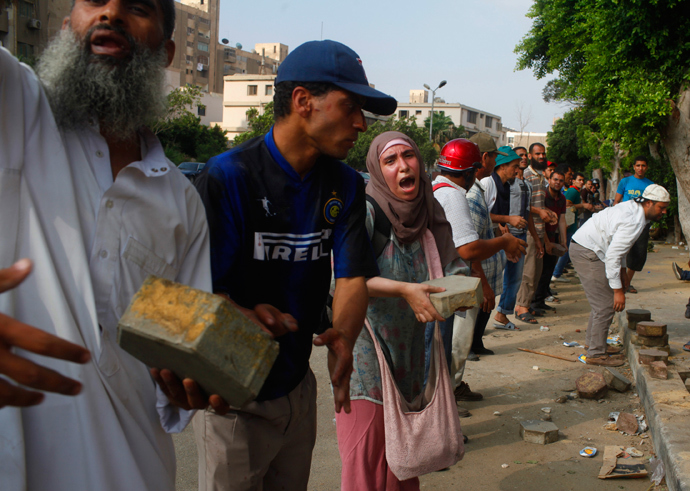The way forward for Egypt is to declare its independence from US
The US gives $1.5 billion a year to the Egyptian government, and if it refused this money they would be able to follow an independent economic policy, supported by the majority of Egyptians, British journalist Neil Clark told RT.
RT:How do you foresee this violence affecting the situation and stability in Egypt?
Neil Clark: It is a very dangerous escalation I think, because whether we take the lie from the army where they say five people were killed or there were 42 people killed or more than that. It’s obviously a very dangerous situation and what the Muslim Brotherhood really has got the keys to this situation how to solve it, what would they do next? They’ve called for an uprising against the government. The Salafists groups have also called that and we are in a very dangerous situation where we could see Egypt break out into civil war. Let’s hope that doesn’t happen. And I think it is very important now for the army to offer an olive branch to the opposition, perhaps, in this state of affairs at the moment.
RT:You say the Muslim Brotherhood has the key to the situation here, but it seems, frankly, that it’s really the military that has the key to the ongoing unrest. If, as reported, it is the military that has opened fire, this is setting the country up for a massive clash. How do you see that being resolved?
NC: The Morsi supporters have to decide what they really want. They don’t have the strength to actually take power. They don’t have the numbers, they don’t have the majority support. The army has got the guns to put it simply.

Therefore they’ve got to decide what their strategy is, and I think they actually hope to get some kind of an offer from the army to join the government, to join the interim government. Perhaps for Morsi to come back in in some kind of capacity, a deputy capacity, for example. That would be one way out of it. Whether the army believes it needs to do that, it depends, really, on how strong their position is. And so the next few days will be crucial in deciding what happens.
RT:Granted the political talks, we are all up into a dangerous territory even before those clashes took place but the second largest Islamist party, the al-Nour party, has already withdrawn from talks to form a new government. How do you think this is going to affect things? Are talks completely breaking down?
NC: I think there is hope. I think what we are going to
see this week are more demonstrations, counter demonstrations,
and we will see more violence, I am afraid. It all depends on
whether some kind of political solution could be found and the
economic problem is really are what fueling this. Political
debate has to go on, but the fact is the economy is getting
worse. Millions of Egyptians are starving, they are unemployed,
young people are unemployed, the price of bread is going up and
it doesn’t matter who is in power unless these economic problems
are addressed urgently this unrest will continue, and any
government that can solve these economic problems will get the
support from the majority of people. When Morsi came into power
with all these promises, he didn’t deliver therefore the unrest
increased. Now we’ve got a new government power but the
demonstration will continue unless they get a grip on the
economy.
Egypt needs economic independence from US
RT:There is a big question whether anyone, can get a grip on the economy. Considering that these protests are funneling so much money away from Egypt. What is the way forward?

NC: The way forward is for Egypt to declare its independence from the US Empire, because the US has played a bad role in all of it. The US gives $1.5 billion a year. They think because they do this they have a hold on Egypt’s economic policies and foreign policy. This is a big problem, it doesn’t need this blank check from the US, it’s about 0.4 percent of its GDP. If the Egyptian government said to the US “we don’t want your money any more” they would be able to follow an independent economic policy, a policy that puts the majority of the Egyptians first.
RT:Islamist parties gained a foothold in other Arab nations which saw uprisings. Do they have anything to worry about?
NC: I think we are seeing this in wrong terms, a battle
between Islamists and secular forces. I think it all depends on
the economy. If any government in Tunisia or in Egypt can
get the economy sorted, they can get the majority support,
whether they are an Islamist government or secular government.
When you haven’t got a job, when you haven’t got any bread, when
you haven’t got food, when you haven’t got hope, you don’t really
care what the government is, whether it is an Islamist government
or a secular government. To answer your question, whether the
Islamist governments are successful, depends on whether they can
live up to economic promises. Morsi didn’t, that’s why he lost
power. He didn’t lose power because he was an Islamist. He lost
power because he wasn’t following the right economic policies.
With Egypt the key point is that the US has dominance over Egypt,
on what it does. Only in May we had John Kerry lecturing Morsi,
saying he has to make structural economic reforms, which would
mean more privatization. I think it is very crucial that Egypt
has its own economic policy that puts the Egyptians first.
The statements, views and opinions expressed in this column are solely those of the author and do not necessarily represent those of RT.













